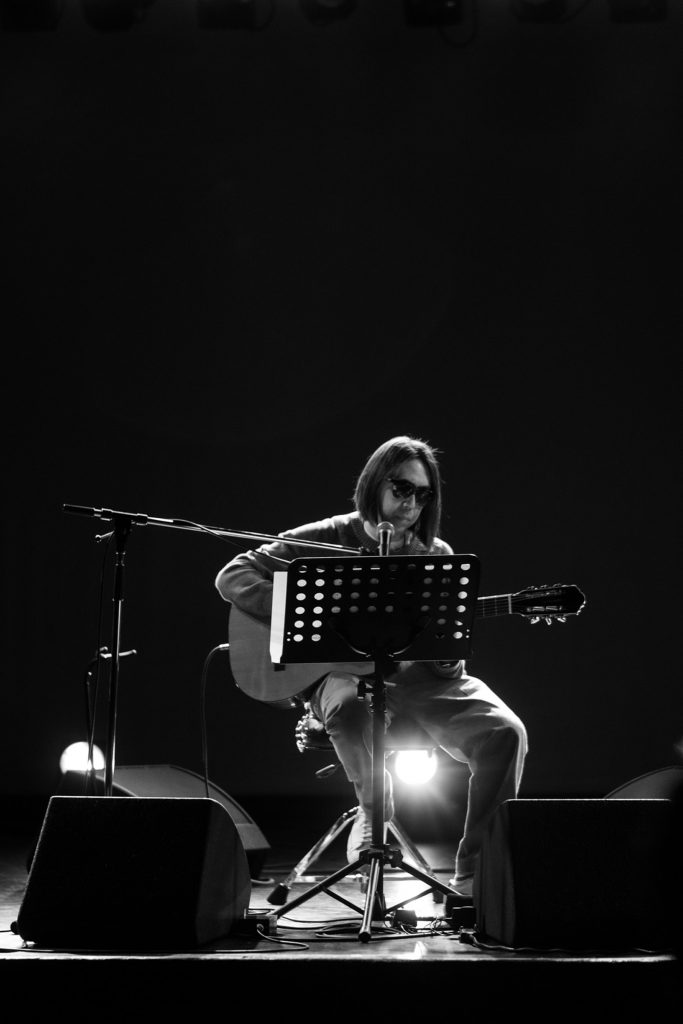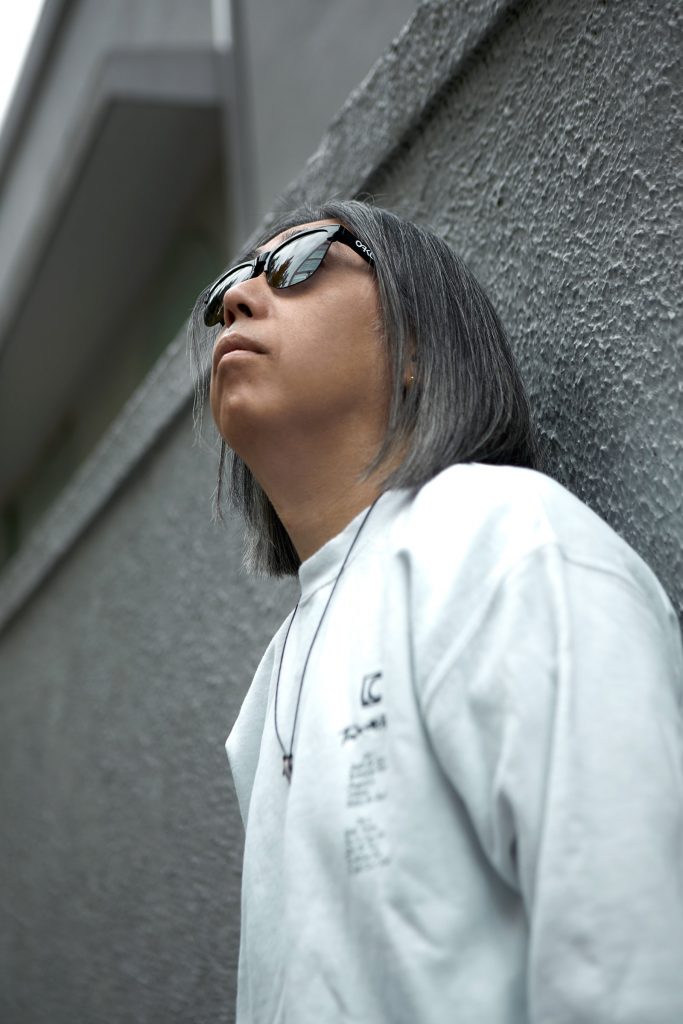Photo: Shoichi Kajino (Studio, Live), Takao Iwasawa(Portrait)
Text: Tetsuya Suzuki
Hiroshi Fujiwara’s new album slumbers 2 is a sequel to the slumbers album released three years ago which again features Shunsuke Watanabe as co-producer. The album combines musical elements such as disco, dub, and house which were all integral to Fujiwara’s career as a musician but reinterpreted through a modern lens. Fujiwara has always been known to adapt his creative output with the times, so we asked him what music means to him in that context. This is part two of our interview with Hiroshi Fujiwara.

Honeyee(H):In terms of it being difficult for music to exist as a form of subculture, the same can be said of fashion and other forms of creative endeavors, because you have to reach a certain amount of sales or level of fame to even exist or get recognized. There seems to be a tendency to say something is uncool if it’s not making money.
Hiroshi Fujiwara(F):I’m not so sure about that. I believe that there are great things that can exist even if they’re not big sellers, or something can be cool even if it’s not famous. In the past, when an artist prioritized what they loved or what they wanted to do, the record company staff or the management would try to persuade the artist to be more conscious of their audience when they create things. But now, when artists create their music, they themselves are very conscious of how their fans will react to it.
H:So with these changes in the music industry from then and now, are there any artists, DJs, or producers from your generation who have been active since the 80s and 90s that you can relate to?
F: Not really. To be honest, I’m different in a lot of ways compared to other people. There might be another artist from my generation who has been focusing on making the same style of music for years which is cool, but I can’t say I relate to that approach.
H:Your approach to music and how you express yourself has evolved with the times, but you have continued to be at the forefront of the scene while following your passions and creating music. Is that something you take pride in?
F:Yeah you could say that, but I’m barely pulling it off. I’ve always stuck to the mindset of first doing what I want to do, and being okay with the sales following later, which has allowed me to somehow keep making music.
H:What is your secret to being able to continue to make music for so long?
F:To be honest, if music was all I did, I probably wouldn’t have been able to make this album. I have other creative outlets outside of music, which allows me to have the luxury of making music. That’s a difference with musicians and artists who take music very seriously and focus just on making music. For me, making music inspires me to create certain designs, so I hope people can see my work as a complete package (laughs).
H:So you won’t deny that this is music made by “Hiroshi Fujiwara the well-known guy from the world of fashion and design”?
F:Yeah, it sometimes feels like I’m being kind of sneaky. But considering all the things I’m involved in, I hope people see that I’m taking my music pretty seriously. Like, “He’s actually pretty serious for a guy who’s making music in his spare time.” (laughs)

After releasing his album slumbers from NF Records, Fujiwara has shared a great personal and business friendship with label owner and leader of Sakanaction, Ichiro Yamaguchi. On the new album slumbers 2, Fujiwara recorded a midtempo dub version of Sakanaction’s hit song “Shintakarajima” and Yamaguchi appeared as a guest on the music video for the song “Territory.” They both sang and performed these two songs at the NF ONLINE festival with Fujiwara on acoustic guitar. Though they come from different backgrounds, they share a mutual respect for each other, and the chemistry between them as performers was incredible. It is no secret that Ichiro Yamaguchi and NF have been a great source of inspiration for Fujiwara’s recent music.

H:No, I actually think you’re very serious about your music. It’s not that you’re just taking music seriously, but in your design work, you’ve been working with big name international brands and have expanded from fashion and products to even spatial design, so it seems like music is your most personal form of expression. I feel that you’re expressing your emotions and thoughts in a direct way through your music.
F:That’s true, especially recently. In fashion, when you work with high end brands, they already have a certain agenda that has been decided beforehand, and I have to create designs to fit that. In the past, I might have rebelled in situations like that, but now when I take on projects, the collaboration has significance to me when I can realize my own ideas and create something that the brand would have never created on its own. In my design work, there are increasingly more projects like that, but as you say with music, I’m able to express myself in the way that I want to from start to finish.
H:For example, you supervised the design of a school uniform for a junior high and high school [1], but would you be open to composing a school song…?
F:No, I wouldn’t be able to write a school song (laughs).
H:Is it difficult to have your music used in such a public way?
F:Well, even if it’s a public project, I can’t take on any project unless I can detach myself from it to a certain extent. With the school uniforms, I was able to use my ideas to deconstruct the uniform and create something that hadn’t been done before, but I don’t think I’m the right person to write a school song. I don’t know, maybe I don’t want people to see me as Mr. Nice Guy. I’m not the type that can be cheerful and friendly with everyone. But I’ve been getting a lot of offers lately for projects that would require me to be sociable in a normal way. When I get offers like that, I introduce them to other people who I think are more appropriate (laughs).

H:So in that sense, making music has a different meaning for you compared to your other work?
F:Whether it’s making music or designing something, when you create something, there is always a moment of joy, especially right before the project is completed, so in that sense they are similar. But with music, I’m able to express the cynical side of myself and my thoughts about society.
H:Are the lyrics for the song “PASTRAL ANARCHY” on slumbers 2 about your idea of a utopian society?
F: In Switzerland, there is a mountain called Monte Verità which attracted thinkers and anarchists around the 1890s, including people like (Carl) Jung, who had gotten fed up with the industrial revolution in Germany. They gathered and engaged in discussions there, grew their own vegetables, practiced nudism, and created a utopian commune. Whenever I visit Switzerland I go there, and I always wanted to make a song about that place. This album was the perfect timing to make that song. Whenever I visit that place, I would always wonder why people who try to create utopian communities sometimes become radicalized. They could choose to live quietly in their utopian world, but there are cases where they become violent xenophobic cults. I was thinking about what is it that makes them change when I wrote this song.
H:So you were imagining liberal communities in places like Monte Verità or around the world when you wrote this song?
F:Yes. It’s as if they’re saying, we’re living the way we want to and not fighting with anyone, so leave us alone (laughs).
H:You have interest in social issues in your own way, but I’m sure that there are people who ask you to be more public about your stance or identity regarding political issues. This seems to be a trend that is getting stronger around the world.
F:I think it’s meaningless to force people to make public statements about their views on politics. But when I look at comments on social media, there are people who say to me, “Why don’t you actively comment on politics?” I don’t think that people should force others to make statements, and I don’t like it when people force their views on other people. If someone listens to the song “PASTRAL ANARCHY” and they happen to read a book about Monte Verità, my hope is that they will think “Oh, this song is about that place.” If they listen to this song several years later or decades later, I hope that it helps them to discover something.

[1] Hiroshi Fujiwara supervised the redesign of uniforms for Seiryo Junior High and High School in 2020.
